182 reads
How the Quest for AI Could Make Us More Human
by
October 15th, 2020
Co-founder at Salley. Named BostInno 25 under 25. Previously founded 2 startups.
About Author
Co-founder at Salley. Named BostInno 25 under 25. Previously founded 2 startups.
